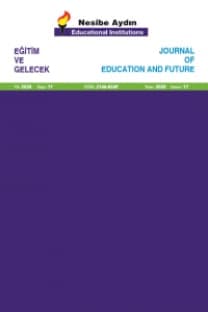Impact of education in institutional and individual development
Sosyal dinamizmin bir sonucu olan hızlı değişim süreci ve çevreselfaktörler insanların nasıl daha nitelikli yetiştirilebileceğini düşünmeyeyönlendir mektedir . Yaşam boyu eğitim olmadan kurumların gelişimine katkısağlayacak etkin bireyler in yetiştir ilmesi mümkün değildir. Bu çalışmanınamacı, yaşam boyu eğitim ve personel geliştirme programlarının, bireysel vekurumsal gelişim üzerine etkisini incelemektir. Araştırma OcakTemmuz 2014tarihleri arasında Türkiye'de gerçekleştirilmiştir. Araştırmacı özel bir ilköğretimokulunda ve bir tekstil firmasında bütün eğitim faaliyetlerine katılmıştır .Çalışmadaki veriler, araştırmacının kendi gözlemleri ve yaptığı toplantılarınışığında araştırmacı tarafından toplanmıştır. Araştırmanın amacı kapsamındaver i toplanırken ilköğretim okulundaki okul yöneticileri, öğrenciler ve veliler ilediğer yandan da tekstil firmasındaki mühendisler ve ustalar ile toplantılargerçekleştirilmiştir. Araştırmanın çalışma grubunda, kurumların her ikisindekieğitim programına toplam 41 kişi katılmıştır. Okul personelinin gelişitrilmesinedayalı eğitim programı sayesinde okuldaki hizmet kalitesinin arttığı, personelarasındaki ekip çalışmasının işbirliğini güçlendir diği ve öğretmenlerin dahaetkin hale geldiği gözlenmiştir. Sonuç olarak öğrencilerin kalitesinde önemli birartış görülmüştür. Araştırmadan elde edilen bulgulara göre, personeliniyileştirilmesi ve geliştirilmesi hem okulun hem de öğrencilerin gelişmesinisağlamıştır. Benzer şekilde tekstil firmasında yürütülen eğitim programı da ürünkalitesinin ve müşteri memnuniyetinin önemli ölçüde artmasına katkısağlamıştır. Kurumlarda çalışan personelin sürekli geliştirilmesi gerekmektedir.Kurumlardaki personel kalitesini artırmanın yolunun yaşam boyu eğitimdengeçtiği bilinen bir gerçektir. Kurumlarda çalış an personelin, eğitim programlarıaracılığıyla daha verimli çalışmaları sağlanabilir ve daha fazla başarı eldeedilebilir. Kurumlarda çalışan personelin niteliğinin artmasıyla, bireylerin vekurumların ilerlemesinde etkili olmaları sağlanabilir.
Eğitimin bireysel ve kurumsal gelişime etkisi
The rapid process of change, which is the result of social dynamism andenvironmental factors, leads societies to consider how to educate more qualifiedpeople. Without lifelong education, it is impossible to bring up efficientindividuals who will contribute to the development of institutions. The purposeof the study is to examine the influence of lifelong education and staffimprovement programs upon individual and institutional development. Theresearch was carried out in Turkey between JanuaryJuly, 2014. Theresearcher himself participated in all the educational activities in a privateprimary school and in a textile firm. The data of the study was collected by theresearcher in the light of his observations and meetings. While collecting thedata within the scope of this study, meetings were organized with the schooladministrators, the students and their parents in the primary school and with thecraftsmen and engineers in the textile firm. In both of the institutions 41 peoplein the education program were regarded as the group of the study. By means ofthe education program based on the improvement of the school staff, the qualityof the service at school increased. Team work among the staff strengthened thecooperation and enabled the teachers to become more effective. As aconsequence, a considerable increase in the students quality was seen. Thefindings of the study reveal that the improvement of the staf f results in theimprovement of the school and of the students. Similarly, the educationprogram carried out in the textile firm contributed considerably to the increaseof the product quality and the customer satisfaction. The quality of the staffworking in institutions should constantly be improved. It is apparent that theway to improve the quality of the staff lies in lifelong education. With theeducational programs, the staff of organizations can work more efficiently andattains more success. Thus, they will be influential in the progress of institutionsand individuals.
___
- Arias, O. (2001). The importance of education for development. GATE Annual Conference: 2001 in retrospect. San Jose, Costa Rica. Retrieved 10 September 2013 from http://www.arias. or.cr/ fundador / speeches/ GATE 081 001.htm.
- Balcı, A. (2001). Etkili okul. Ankara: Pegem. Champion, R. (2003). The real measure of a professional development programs effectiveness lies in what participants learn. Journal of Staff Development, 24 (1), 1 - 3.
- Fındıkcı, I. (2001). İnsan kaynakları yönetimi, management s eries . Istanbul:Alfa.
- Gökçe, E. (2003). Eğitim ihtiyaçlar ının analizi . İş Fikirleri Dergisi, 5 ( 60) .
- Gökçe, E. (2004). İş yaşamı nda problem çözme. Security Sciences Faculty Journal , 12 ( 48) .
- Hirsh, S. (2004). Putting comprehensive staff development on target. Journal of Staff Development: Retrieved 19 August 20 13 from http://www.nsdc.org/library/publications/jsd/hirsh251.cfm.
- Imel, S. (1995). Workplace literacy: Its role in high performance organizations . ERIC Clearinghouse on Adult Carees and Vocational Education. Columbus OH. Eric Identifier: ED383858.
- Kamp, D. (1998). Sharpen your teams skills in people skills. UK: McGraw.
- McQuarrie, F., Wood, F. H. (1999). On-the- job learning. Journal of Staff Development, 20 (3).
- Richardson, J. (2000). Learning benefits everyone. Journal of Staff Development, 21 (1).
- Riddell, W. C. (2004). The social benefits of education, taking public universities seriously conference. USA: Toronto.
- Sachs, J. (2005). Activist teachers: A professional responsibility for a responsible profession. ( Unpublished manuscript). Oxford: Teaching and Teacher Education Research Group Seminars of Oxford University Department of Educational Studies.
- Thompson, L.B. (1998). The new managers handbook, UK: Richard D. Irwin.
